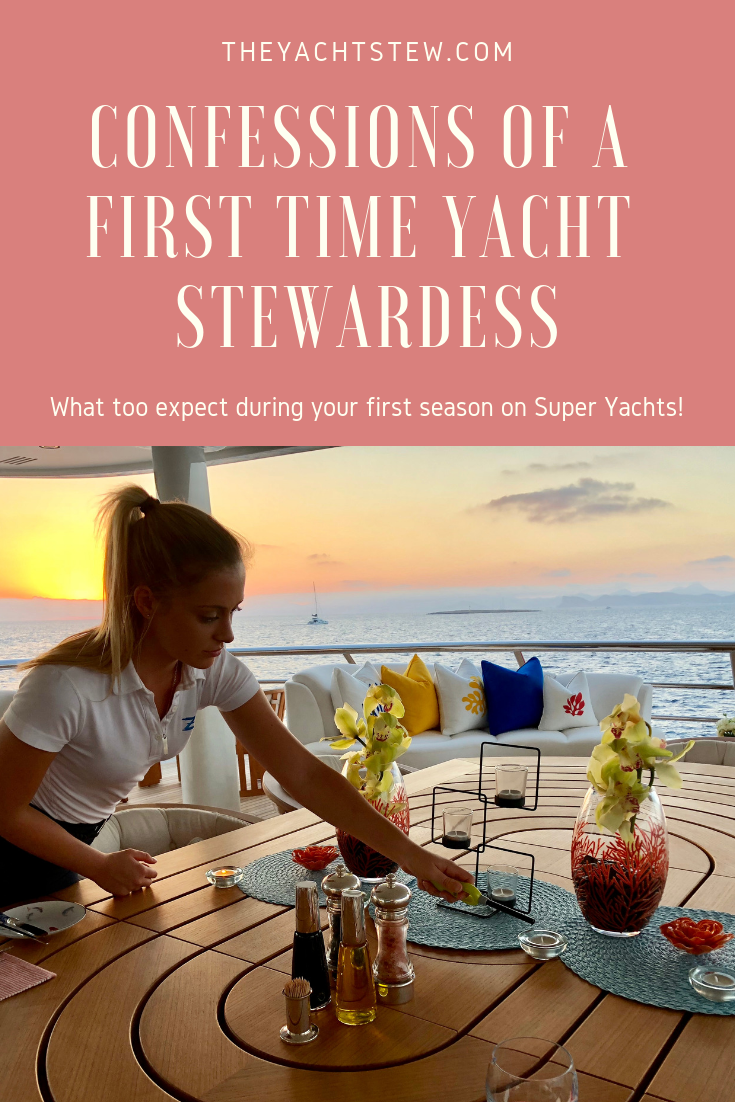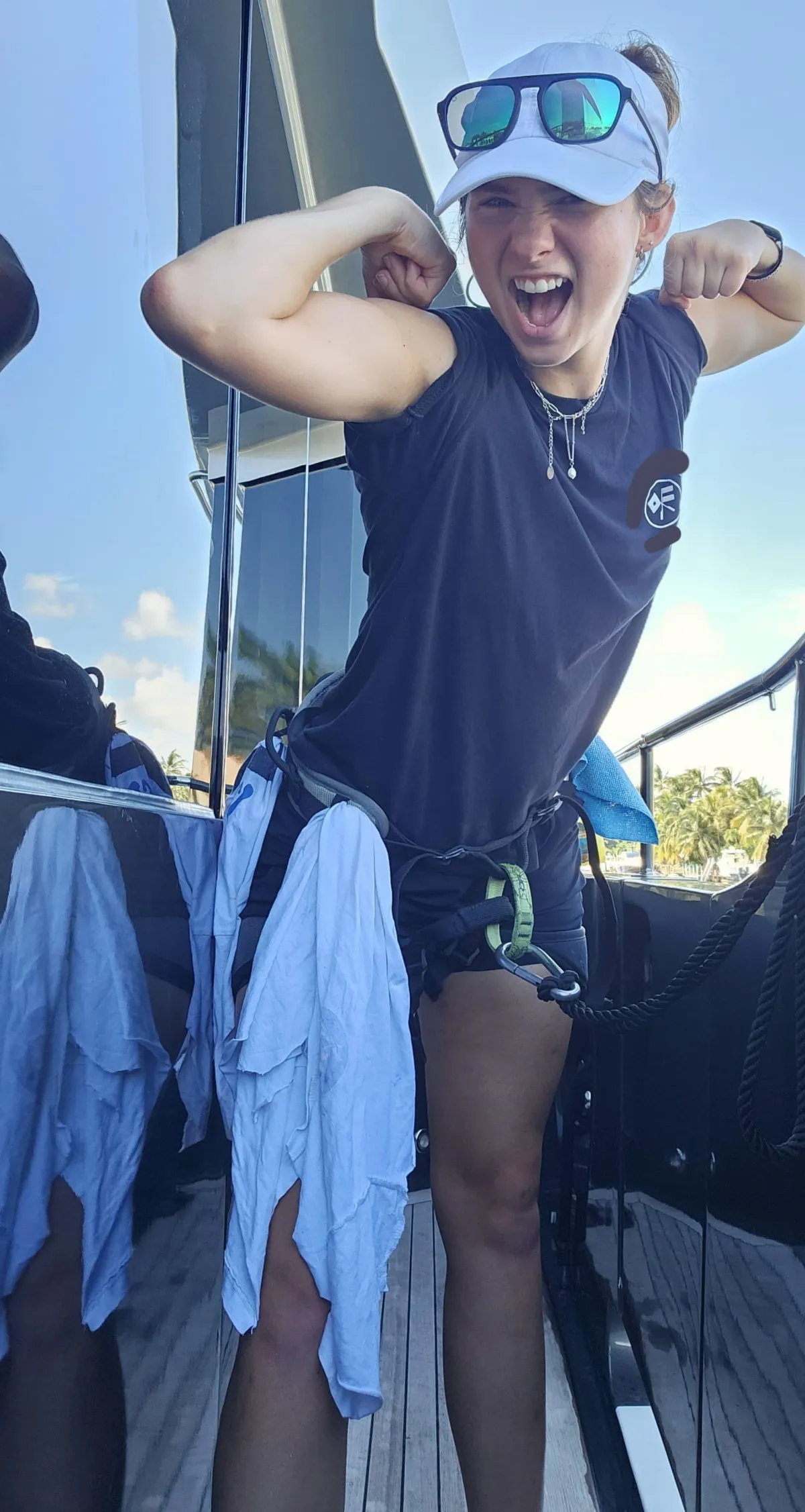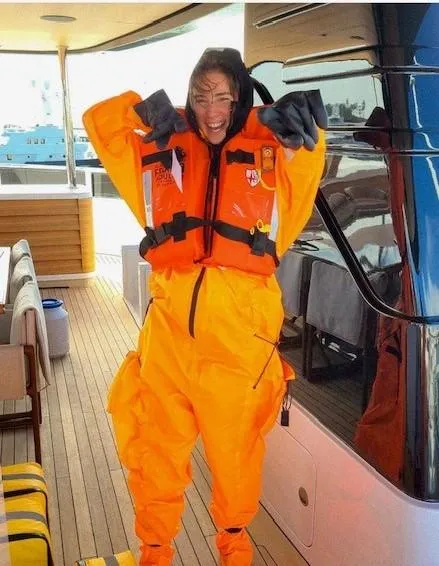Impartial training and careers advice
Call us: +441983 280 641
+441983 280 641
- How to become a Yachtie
So you’re thinking about becoming a Yachtie?
You may have a friend or relative who already works in the industry, or you have watched TV programmes like Below Deck , you know working on a yacht is the right for you, but where do you start?
With the potential to earn great money, travel, and work with loads of like-minded people, it’s not surprising this job ticks a lot of boxes for many people.
Becoming a Yachtie and getting paid to work on luxury yachts may seem like a job and industry that only the elite can have access to, or it just seems too confusing to start.
However, with an understanding of the requirements, certification, and having some expectations of what job role you should be looking for, starting work as a Yachtie will not seem so daunting.

What is a Yachtie?
Before we go any further, let’s make sure we are all singing off the same hymn sheet.
A Yachtie is a broad term used to describe anyone who works on a yacht. More specifically, it has become the term for people working as yacht crew on superyachts.
A superyacht is a very large boat that is extremely luxurious and often owned by multi millionaires and billionaires.
These Yachties who work on superyachts hold a number of different positions. Most Yachties will start their superyacht career working as a Deckhand or Stewardess. With more experience and responsibilities, your role will change as you progress up the career ladder.
It’s worth noting there are other types of yachting and Yachties. The other kind of ‘Yachtie’ could describe those who hold their Yachtmaster qualification and have jobs like skipper charter boats.
Job roles for new Yachties
Yachties new to the industry (also known as ‘Green’ Yachties) will traditionally apply for entry levels roles, which are Yacht Deckhands or Yacht Stewardesses.
These are both very different jobs, so you need to be sure which one you want to do and start training for that career path.
Yacht Stewardess (Stew)
A Stewardess, or Steward , looks after the interior of the yacht. This means anything that happens inside the boat, you will be responsible for it.
Think of any job in the hospitality industry and then combine it into one role on a yacht, that is what you will be doing.
From making beds, doing the laundry, cleaning, serving food, and hosting dinner, you will do it all to a 5-star standard. Anything less than perfect, and your guests won’t be satisfied.
It’s the small things that make the difference between high standards and exceptional standards. You must have a great eye for detail and be able to make sure no stone is left unturned. Everything on board the ship must be 100% perfect at all times.
You will be reporting to Chief Stew, who will be your manager and give you your task list. After a good few seasons as a green Stewardess, you will have enough experience and confidence to apply for Chief Stewardess roles.
Yacht Deckhand
In contrast to the Stewardess role, Deckhands look after the exterior of the boat.
Predominantly a male role, Deckhands will do everything from general maintenance to cleaning the teak deck, looking after the toys (Jet Skis, etc.), and even driving the tenders.
Deckhands should know how a yacht operates, the basic terminology used onboard, how to tie knots, and loads and loads of enthusiasm.
Deckhands may also dip in and out of helping the Stewardesses, and it isn’t uncommon for Deckhands to give a hand during busy evening meal preparation and service.
5 steps to Becoming a Yachtie
With an understanding of the job roles available, you can now decide which one best suits you. With the right attitude, qualifications, and knowing where to look for work, becoming a Yachtie is achievable for anyone who wants it.
- Have the right attitude
- Pass an ENG1 medical
- Complete STCW Basic Safety Training
- Gain experience
- Go to a superyacht marina
1. Have the right attitude
Along with gaining the correct qualifications to prove your competence, to become a Yachtie, you must have certain characteristics to thrive in this industry.
Yachties have to be well presented, articulate, know how to take orders, and be able to work hard, all with a smile and enthusiasm. You have to be able to work incredibly long hours, sometimes under stressful conditions, without losing your patience.
Having a job on a superyacht may sound glamorous, but if it’s your 10th day working in a row and you’ve got your head stuck down a toilet trying to clean it, you may want to think again. To become a Yachtie, you have to be happy with spending a lot of time away from home without seeing your friends and family. This may all seem obvious, but this situation does not suit everyone, and without careful consideration of the negatives, you will leave this industry quicker than when you arrived.
2. Pass ENG1 Medical
The first actionable step you need to take to become a Yachtie is gaining an ENG1 medical certificate. The ENG1 medical is an examination by an approved MCA (Maritime and Coastguard Agency) Doctor to make sure you are fit and able to work at sea.
Every single person working at sea must have an ENG1 medical certificate , without this, you are not able to start working on superyachts. The examination will take around 45 minutes, during which the doctor will go through a checklist to make sure you have no underlying health conditions that may impact the safety of you or anyone else on board the ship.
The most common reason new yachties fail the ENG1 is colour blindness. Surprisingly many people can go through their whole life without knowing they are colour blind. However, on board a ship, this can have huge implications. If you cannot identify signals and lights correctly, it will be impossible for you to help navigate the ship in an emergency. Unfortunately, this means you cannot start work as a Yachtie.
3. Complete STCW Basic Safety Training
Another requirement for working at sea is completing STCW Basic Safety Training . Similar to the ENG1 you can only get a job on a yacht if you have the STCW certificate.
STCW stands for ‘Standards of Training, Certification and Watchkeeping’. It is to make sure that all Seafarers have an understanding of what to do in an emergency and are aware of the procedures required.
STCW Courses are action-packed and quite a bit of fun. From fire fighting to sea survival, you will get stuck in learning, and learn loads of new skills.
4. Gain experience
If you are lucky enough to have a job offer on a superyacht, then having your ENG1 and STCW certificates will be enough.
Don’t worry if you haven’t already got a job offer, it’s quite normal to go through all these steps and not have a job lined up yet. If this is the case, gaining more experience and qualifications is a good idea to give you a competitive advantage over anyone else applying for the same job role.
This is achieved through signing up to a Deckhand or Stewardess Course. On these courses, you will get your standard STCW certificate and a list of extra qualifications demonstrating your competence, ability, and commitment to the industry.
Deckhands will learn how to drive a small yacht, engine maintenance, general yacht repair, and how to clean teak properly. Stewardesses will understand wine and how to serve it, the art of flower arranging, and how to drive a powerboat.
5. Go to a superyacht marina
After you have completed your superyacht training, now is the time to head out to France and look for work. Along with signing up to yacht crew recruitment agencies, going to one of the main superyacht marinas and handing out your CV to Captains is a great way to find work. This is known as dockwalking.
If you complete your Superyacht Course with us, you will have the option of signing up to our recruitment day in Antibes, France. We head out to France as a group, talk you through the process and offer you our industry contacts.
This is a great way to start your journey, and all our students find work in no time.
How much do Yachties make?
So you’ve heard you can make a good amount of money working on superyachts? Along with the travel, the great salary is why many people decide to become a Yachtie.
Like a job within any industry, salary varies. A Superyacht will agree on a crew salary budget with the owner of the yacht.
If you are just starting out, you can expect a salary of around €2,200 – €3,200 per month. However, the industry standard is €2,500 per month. Once you gain more experience and qualifications, your salary will increase.
When you look at the salary at face value, it looks great but not incredible, however when you are at sea, you have zero outgoings. Working on a yacht means you don’t have to pay rent, bills, or buy food which will save you heaps of money compared with working at home.
If you want to see the salaries of all yacht crew, check out our Salary Guide.
Do Yachties pay taxes?
Another reason why the salary is so appealing is that in most cases Yachties don’t have to pay tax.
This is a government scheme called the Seafarers Earning Deduction , and providing you are eligible, Yachties can keep 100% of their earnings.
To be able to apply for Seafarers Earning Deduction, you must be working on a ship outside of UK waters for a period of 365 days. This doesn’t mean you have to spend a whole year at once away from home, rather you can only apply once all the days you work on a yacht adds up to 365.
Being able to understand this tax scheme will be hugely beneficial before you start working on a Superyacht.
Download our free Guide
Want to know more about working on a Superyacht, please download our free guide .
Related articles
- Seafarers Tax
5 ways to ensure your SED claim is rock solid
The Seafarers’ Earnings Deduction, often referred to as the SED, is a tax legislation that enables seafarers to claim back their UK income tax. It a...
Do I need to pay off my Student loan if I work on a Superyacht?
Good question! First, let me say that the information below is aimed at people who have studied in the UK and took out a Student Loan to cover course ...
Have I got the right experience to work in yachting?
If you’re thinking about working on board a Superyacht, we share the skills and experience you need and how to get into the yachting industry in thi...

- Career Advice
- Salary Guide
- Dockwalk Presents
- Digital Dockwalk
How to Get a Job as a Yacht Stewardess

Kate got her start in the yachting industry working as crew. She spent five years cruising the Bahamas, Caribbean, New England, and Central America, then segued that experience into a career in marine journalism, including stints as editor of Dockwalk and ShowBoats International .
If you’re not afraid of hard work, have a knack for hospitality and service, and are a team player, then traveling the globe as superyacht stewardess could be in your future. Here is everything you need to know to land a job as a stewardess on a luxury yacht...
A yacht stewardess (or steward) is an entry-level position in yachting that provides a gateway to a career in hospitality at sea. A stewardess serves a vital role as part of the interior team and is responsible for the upkeep and presentation of the interior of a vessel.
One of the greatest appeals of working as interior crew on a superyacht (other than travel and tips ) is that the role of a stewardess doesn’t require extensive schooling or qualifications. While experience in the hospitality or customer service sector is advantageous, when starting out as a junior steward or stewardess, it is more about having a friendly disposition and being willing to learn and work hard.
“The ideal junior stewardess will have an eagerness to absorb information and learn the ropes properly, the ability to take direction and follow instructions, as well as the confidence to ask questions when clarification or additional instruction is needed,” says Sarah Bester with Northrop & Johnson Crew Services .
What is a Yacht Stewardess?
A steward or stewardess maintains the interior of a superyacht and provides five-star service to its owners and guests. On charter or owner trips, the interior team handles beverage and meal service, housekeeping, and laundry, all with the highest attention to detail. They have the most face time with guests so are responsible for relaying their wishes to the deck department, chef, and captain.
What Does a Yacht Stewardess do?
A junior member of an interior team on a yacht larger than 45 to 50 meters will typically start his or her career in the laundry room and/or in housekeeping rather than in service.
On smaller boats, the stewardess can be a department of one. “If you’re a solo stew you’ll be up early doing it all,” says Alene Keenan, a 30-year veteran of interior work who has literally written the book on yacht service, The Yacht Guru’s Bible. The day starts with opening duties: “setting up for breakfast, preparing breakfast, serving and clearing breakfast, laundry, cabin service, housekeeping duties, more laundry,” lists Keenan. This is followed by lunch service and more housekeeping and laundry, ongoing beverage service, setting up for afternoon activities, cocktails and hors d’oeuvres service, dinner service, cabin turndowns, finishing and returning laundry, and to close the day, pulling dishes, décor, and service items for the next day’s breakfast.
“If you have two or more interior crew, the duties are shared and probably rotated, and start times depend on hours of work and rest,” Keenan says.
- Top Tips For Working as a Stewardess
On larger yachts, the chief stew will provide his or her team with a checklist of duties to perform for each shift. “The routine will generally be the same,” says Chief Stewardess Tracey Bamforth . “You will be allocated a shift, shift duties, and shift expectations. You will wake up and dress in your on-charter uniform, making sure you are presentable, fresh, and on time. It’s important to remember that when the guests are on, your need to manage yourself to the best of your ability: speaking softly, working smartly, being very aware of your environment — for example, not leaving cleaning products out and about and keeping the yacht to its absolute best standard.”
Off-charter is when maintenance, deep cleaning, and inventorying are done in addition to daily laundry, crew mess, and bridge duties.
Who Does a Yacht Stewardess Report to?
This varies depending on the size of the yacht and crew. “Every yacht is unique and could have a different set-up; nothing is black or white,” says Lien Eggermont, senior yacht placement consultant for interior crew at Viking Crew .
Generally, when a stewardess works alone, they report to the captain. When there are two or more in the interior department, the junior would report to the chief stewardess, or with larger teams, they may even report to the second steward/ess. For the largest of superyachts, each interior division — housekeeping, laundry and service — will have their own head of department (HOD), so for example a housekeeping stewardess would report to the head of housekeeping.
What Qualifications Do I Need to Become a Yacht Stewardess?
All crew need STCW basic safety training , a five-day course, and an ENG1 medical certificate , and some yachts may also require certification in Food Safety & Hygiene, a one-day course.
On top of these necessities, there are numerous options for yacht-specific interior training, but many chief stews, like Robert, prefer to teach on the job. “Most of the skills you need in yachting, especially in the interior, you learn as you go,” she says.
The amount of knowledge you need going in may depend on when you’re hired. “Early in the season, the HOD will have time to train and teach everything from scratch. Mid-season they don’t have time to hold somebody’s hand — in the nicest possible way — and will need somebody who can hit the ground running,” Eggermont says.
Courses that introduce entry-level candidates to yacht interior work are offered in many countries around the world. “Bluewater hosts some fantastic courses; their Yacht Interior Service courses start at a zero-to-hero course and can really help with a newbie or green stewardess who wants to acclimate and understand the principles and products used on a vessel,” Bamforth says.
Bester points out that additional courses like silver service and WSET (Wine & Spirit Education Trust) can help a candidate stand out. “These courses are an additional investment and thus an indication that the candidate may be more career minded,” she says.
- Recommendations for Entry-Level Interior Crew
“Training has always been a privilege in my mind,” adds Bamforth. “Most newbies starting out will already be stretched from arriving from a new country, trying to find a new role, living in a crew house, and then to expect them to start off with a couple thousand dollars in courses under their belts is somewhat unfair. I believe in the ability to train and trial a newbie and give them the opportunity to show you they have the capacity to work, learn, live in a very close environment with others, repeat the systems they are learning, and, most importantly, have a good attitude!”
Maxine Robert, chief stewardess on 47-meter M/Y Loon , adds, “Having a positive attitude is everything as we live in such close quarters and work very closely with each other every day.”
What Experience Do I Need?
“Many programs will consider junior stew candidates who are green to yachting but come with strong land-based hospitality experience,” says Bester. Eggermont seconds this: “Waitressing in high-end restaurants or hotels, background in events, housekeeper in a hotel or, for example, a boutique B&B. But also candidates who have worked on board cruise ships or river cruises will be considered.”
Keenan points out a wide range of work experiences on land that translate to interior work at sea, listing: “restaurant/hotel work, flower arranging , event planning, retail sales, anything with customer service.”
Furthermore, Bamforth says she considers a potential new hire’s complete background, including things like whether they have finished university — “my thoughts would be that they have a ‘stick it out to the end’ attitude, and an ability to think on their own, which is always a plus,” — or if they played team sports at school — “shows an aptitude for playing nicely with people.” She says she has enjoyed working with hires from a wide variety of backgrounds, from advertising to having a family member who is a florist. “Nurses or medical-trained candidates I find to be extremely empathic and good with other crewmembers,” she says.
How Much Does a Yacht Stewardess Earn?
The entry-level starting salary can range from $2,500 to $3,500 per month, says Bester at Northrop & Johnson. “Charter programs will typically be on the lower end of the salary range due to the additional income crew receive through charter tips,” she says. Eggermont at Viking Crew says the average is €2,500 per month.
Dockwalk conducts an annual salary survey that polls both placement agencies and working yacht crew. According to its most recent 2020 Salary Survey , the low end of the range given by agencies — where most junior crew would start — is between $2,250 and $2,800 per month. Interior crew who aren’t working as the chief or solo self-reported that they made from $3,000 to $4,500 per month, with the bigger bucks being netted on bigger vessels.
The earning potential of interior crew grows alongside experience. At the top of their game, a chief steward/ess on a vessel longer than 70 meters earns $7,000 to $12,000 per month, says Dockwalk ’s wage guide.
“I’d say don’t be too picky as a junior crewmember,” Eggermont says. “If a 90-meter-plus (yacht) offers you a role at €2,000 with potentially an increase after probation or so, I’d say take it. Do a season, do your best so that you get a great reference. You need a foot in the door!”
Related articles:
- What are the Different Crew Roles on a Luxury Yacht?
- How to Get a Job as a Yacht Chef
- Everything You Need to Know About STCW Training
- What is the ENG1 Medical Certificate and Why Do I Need it?
More from Dockwalk
Most popular on dockwalk.
First Time Yachtie
by Gemma Hulbert
If you followed my instagram over this past Med Season, then you would know how incredibly happy I was with my Interior Team. The girls were just outstanding to work with & there was never a shortage of laughter around the boat.
I also had the rare opportunity of hiring two junior stewardesses for this past season. I don’t think enough yachts hire green stews and I really wanted to do what I could to help the newbies so I hired 2 greenies! I had over 400 cv’s when I first posted about the position, it was quite full on as I looked at every single CV.
Majority of the DM’s and messages I get are from New Stews wanting to get into the industry but aren’t sure what to expect. So last week I asked if any of you had questions for a stewardess that has just completed her first season & called Paige, (one of my rockstar junior stews from last season) to see if she wouldn’t mind sharing her thoughts from this past summer.
Meet Paige, a laundry rockstar & Demi Lovato’s biggest fan.

Paige & Chandler, my two gorgeous junior stewardesses from last summer!
Hey, I’m Paige, a 22 year old South African Yachtie. Working in the yachting industry is something I had planned on for years! I come from a very small part of the country and saw yachting as a remarkable opportunity to experience parts of the world that I only ever dreamed of. I had initially heard about the industry when my uncle had started working on the yachts many years ago, and then more recently when my older brother had headed to Florida as a deckhand.
Not knowing what I wanted to do after school, I went to Uni and ended up completing a post graduate honours in Financial Management. I knew that once I had handed in my thesis and graduated, that it was time for me to take a bigger leap and book a one-way ticket to Europe to pursue a career in yachting.
I was aware of the challenges that lay ahead, in trying to stand out from the crowd and land my first position as a junior stewardess. However, I was willing to take it all on as this was something that I have always wanted to do and I truly believed in my ability to be the best stewardess I could be. I have just finished my first season on board a 65M…what a season! I have learnt more than I ever imagined I would, both in the industry and in myself. I hope to eventually use my qualifications in the industry in a more senior position and aspire to be a purser.
How long did it take you to get your first job?
I had been in Palma for about two weeks when I got a phone call from my Chief Stew. Gemma had seen a post that I made for myself on Facebook & I was lucky enough to receive a message from her asking for my CV! Within two days of a phone call interview and a few email exchanges, I had a one-way ticket to Barcelona where I joined the boat. I would highly advise making use of social media – be natural, positive, and most definitely ready to hit the ground running.
What was it like interviewing for your first job?
As a greenie in the industry, ensuring you have an interview is only half of the battle won. Seniors will only interview you once they have sifted through the hundreds of CV’s they get and notice that you stand out from the rest. The other (and most important) half, is ensuring that your interview is successful. When Gemma interviewed me, I was of course very nervous. However, she made me feel very calm and asked me questions in a very relaxed way, which helped me answer truthfully and confidently. I was open and honest about my lack of experience. However, I was able to convey that I was eager to start and willing to learn as much as possible along the way.
Is the split between work and free time what you thought it would be?
This depends entirely on the boat and the time of the season. When I first joined my boat before the summer season had begun, we worked a regular 8am-5pm shift with weekends off. After 5pm we were able to do whatever we wanted, and were fortunate enough to do this in Barcelona! However, when the season began, the work hours became longer and it was very rare for us to have any days off. I truly appreciated when we did get days off during the season, as it was an opportunity to explore places of the world I had never seen before and it was a way of relaxing before getting back to work again.

Have you found it difficult from being away from family and friends? Did you find it difficult to stay in contact with everyone?
YES. My family and I are extremely close, and even when I moved across the country back home to study at university, I was still able to see them regularly. It is slightly trickier doing that half way across the world! And when the reality sets in that you may only see them in a years time, it can be overwhelming! What I find most difficult is seeing family/friend get-togethers or Sunday lunches posted all over Facebook (Thanks mom!). Whether it is small little “I love you” messages to my brothers or long WhatsApp calls with my parents, I always feel so much better once I have contacted them (especially after a long day!). No matter how busy you are during guest trips, or how bad the WIFI can be, send your loved ones a quick message when you get a little break – they will appreciate it more than you know (and quite literally, would just like to know where in the world you are!)
What did you do onboard when you were asked to do something that you didn’t know how too?
I was never afraid to ask questions. I would much rather ask a thousand questions and complete the task correctly than wing it. I was lucky enough to have a chief stew and second stew who were both very patient and always took the time to train me and show me how to do things a certain way.
What do you know now about yachting that you didn’t know before your first season?
Before my first season, I was a complete greenie! There was a lot I thought I knew before embarking on this journey, however, that all changes once you step on board. You realize that your seniors have been doing this for many years before you so their advice, guidance and experience is a lot more to go by than what you once assumed.

Favourite part about working on board?
No matter how overwhelmed I was, or how much laundry I had to get through, having fun with my crew always made the world of a difference. Getting to know each crew member one on one and forming friendships with them was one of my favourite parts. Don’t get me wrong – not everyone will be your cup of tea. But you don’t realize how close you get to many of your crew members after sharing living spaces with them, eating with them, working with them and socializing with them! My crew had an incredible sense of humor, and when I look back on my first season, I remember having a lot of good laughs.
What was a highlight you didn’t expect?
My boat spent many days at anchor during the summer, and our captain was kind enough to let us use the water toys every so often when the owners had left for a few days. I am a complete water baby by nature, so being able to take the sea bobs out, ride the jetskii’s or go paddle boarding in the beautiful turquoise water of the Mediterranean was most definitely a highlight of the season for me! Nothing beats catching a tan on the swim platform and going for a dip in the sea after a day of work!
Paige didn’t add in that she’s the BIGGEST Demi Lovato fan & convinced us all to go to her concert in Barcalona. The tickets were only 4 Euros & Paige was given VIP, front row tickets when she arrived. Safe to say, she was on cloud nine for a solid 7 days after that & Demi was being played on repeat in the Laundry room!

What was the toughest part that you weren’t expecting or prepared for?
Before joining my first boat, I knew that when the guests were on that it would be a lot of work. The truth is, you don’t really know what “full steam ahead” is until you’re actually doing it – it requires a lot of physical AND mental endurance. During guest trips, there is very little time for yourself and I suppose I was very naïve to expect otherwise!
What was the most surprising skill that you learned and used?
I definitely learnt a lot about time management with my time on board. I found that after a few weeks of doing things over and over, that I got better and faster. I learnt how to prioritize tasks – super important when you are under pressure and need to get everything done whilst still maintaining a high level of quality.
Thank you so much Paige for taking the time to share your thoughts & stories with everyone! I hope this helps all of you that had questions about starting out onboard! If you are looking into yachting as a possible career, check out this blog post ( CLICK HERE ) to learn all about how to get started!

- Latest Posts
- How to build a yachtie CV! - April 3, 2019
- After Eight Martini - February 22, 2019
- Pretty in Pink Tablescapes - February 20, 2019
Get inspired! Pop your email in to get our cocktail recipe cards!
Download and print off our recipe cards and take them with you to all of your boats, so next time a guest asks for a cocktail and says “Surprise me”, you’ll have some delicious go-to recipes. By signing up, you’ll also get our weekly “Happy Hour” email with a different cocktail recipe each week, helpful stew tips and the latest exciting updates from The Yacht Stew.
Sign Me Up!
We promise not to spam you! You can unsubscribe at any time.
Related Posts:

The Importance of Pap Smears
Today's blog post is a little different and for a good reason! At the beginning of the year (2020), one of my...

Online Wine Courses
Online Courses Whether you are for them or against them, online courses seem to be the hot topic right now...

RECRUITMENT AGENT
After 8 adventurous years of working on yachts, Taryn decided to return to life on land. She currently lives on the coast of sunny South Africa. Fresh off the yachts and having worked in high-end resorts and hotels, Taryn has a broad knowledge of what the industry needs and is well-qualified to find the perfect match for both crew and the yacht. Taryn’s friendly, kind demeanour and passion for the industry ensure to provide excellent and professional communication with clients and crew at all times. When Taryn is not working you can find her on the beach, participating in any form of outdoor activity or sharing a bottle of wine with family and friends.

Ciara joins our team with 5 years of experience in the industry and is based in Bristol, UK. She brings her people skills and passion for luxury customer service into recruitment whilst maintaining a calm and kind nature for both crew and clients. When not working, Ciara continues studying music history and classical music performance and enjoys walks in the countryside with her husband and sausage dog.

Mandy has 8 years of experience in the industry and brings her A-game from the South of France. She brings a unique and energizing perspective with 5 years of land-based recruitment experience in London and is sure to make anyone feel welcome with her kind-hearted nature. When she’s not working, she can be found spending time with her husband and daughter, enjoying the beauty of France.

Eloise brings 3 years of experience in the industry to our team. Currently living in South Africa, Eloise was the first member of the TYSR team and has since built lasting relationships with clients and crew. Eloise splits her time between South Africa and TYS HQ in the UK. She is incredibly caring and ensures all crew and clients get the best possible support, with high standard of customer service. When not working, Eloise spends time with friends and family enjoying wine farms and safaris in sunny South Africa.

Gemma Hulbert
FOUNDER AND CEO
Gemma founded The Yacht Stew in 2016 and has over a decade of experience in the industry. When she founded TYS she wanted to create a community for people in the industry and create an incredible support network that was both informative and nurturing. She brings her keen eye for detail, and her incredibly compassionate perspective to anything she does, and is sure to get anyone inspired. In her spare time Gemma loves to be with family and friends, or out exploring and traveling with her husband.

Thank you for subscribing! Please check your email for a confirmation link!

How To Become A Yachtie | How To Land Your First Yacht Job
How would you like to travel the world with no expenses while getting paid to do so?
Sounds too good to be true, but it’s not!
Working on superyachts, that is exactly what happens. You get paid a great wage all while traveling the world with no expenses.
Most readers have already heard about working for a cruise line, however, not many people know they can skip the crowded cruise ships and work on a Superyacht for the rich and famous.
If you have seen or heard of “ Below Deck ” then you already know all about the yachting industry.
With the popularity of this TV drama series, more and more people are trying to get into the industry.
But with more people applying for jobs each year, it is getting harder and harder to break into the industry. This is why I decided to write this, to help people like you on how to become a yachtie.
How To Get Into Yachting
Before you start your career in yachting, you’ll need to get your STCW 95 and your ENG 1. YOU CANNOT WORK ON A YACHT WITHOUT THESE.
The STCW 95 is a one-week basic training course that costs around $1000-$1500 depending on where you take it. To find a location near you go to the STCW 95 course .
This course covers basic firefighting training, first aid, and sea survival. You will be in charge of a multi-million dollar, even billion-dollar yacht.
They want to make sure you are wise and capable of taking care of it.
You will also need to get your ENG 1 before you can begin working on a yacht. It is a simple health exam to ensure you are physically fit and is entirely for safety reasons.
You can’t be out at sea and have health issues that might require emergency evacuation.
It is normally a good idea to get your ENG 1 while you are taking your STCW 95 course. There are only a handful of doctors that are permitted to assign you an exam.
They all tend to work from where the yachts are based and the exam will be in high demand.
The ENG 1 is usually around $100 – $150, and it only takes about 15 minutes, but it is REQUIRED.
For anyone interested in working for the deck department, it is a disadvantage if you are color blind.
If you are only wanting to go yachting for a year or two, this won’t be a problem. But, if you want to make this a career and work your way up to captain then you will not be able to do so.
You will be in the wheelhouse at night and doing watches so you’ll need to know the difference between red and green lights.
Not sure what you want to do on a yacht? Click here for the best entry-level jobs .
Also, be aware that yachting is a very old-school industry, and having visible tattoos might hurt your chances of getting a job. Although this is becoming less and less of an issue.
11 Tips On How To Become A Yachtie

1. Make a Kick-Ass CV
With more and more people joining the yachting industry, you have to make yourself stand out for an entry-level position.
A standard CV in the yachting industry includes a professional photo of yourself (Be sure to wear a white polo shirt ), nationality, date of birth, smoker/nonsmoker, tattoos, and previous work experience.
Also include hobbies, places you’ve lived, accomplishments, and what you do for fun.
You never know what will get you hired, it could be that time you climbed Kilimanjaro! If the first mate that is hiring has also done this, he will most likely put you in front of the line and call you first.
If you pass the phone interview and get along well with the crew, you will most likely get the job.
Canva is also a great place to go to get a great CV template to make yourself stand out
2. Dockwalk
Dock walking is like cold calling but in person. You have to get used to rejection in yachting, you might not be the right fit for one yacht but you will be the perfect fit for another.
DON’T take rejection personally and DON’T give up.
One of the best ways to get a job in yachting is by dock walking, talking to the crew, and asking if they have any day work.
After your day work, you never know what might turn into a full-time job. Yachting is all about networking.
For a full guide on dockwalking
3. Yachting Facebook Groups
Facebook is great these days for their group forums. Jobs are constantly being posted in Facebook groups so join as many as possible.
They are also great for keeping up-to-date with topics that are going on in the industry.
Joining one of these groups is a great way to find out information on How to become a yachtie or how to land your dream job.
Be sure to focus on groups for the area you are based in. If you are in Fort Lauderdale, it doesn’t make sense to join a crew Facebook group based in Antibes, boats want local crew.
If you are new to the industry, no one is going to fly you out to the boat.
Be aware of what you post in these groups, greenies are constantly ridiculed for foolish posts and stupid questions.
But if you are clever enough to post a creative or funny posting looking for work, it might even land you a job : )
Here are some great Facebook groups to get you started
- Yacht Crew Wanted
- Med Yacht Crew Jobs
- Yacht Chef Jobs

4. Daywork123
This is a great website for crew seeking work in South Florida, they are constantly posting jobs and day work. You can upload your CV and apply for jobs that are posted here.
If you post your CV on this website be awake and ready to work by 8am. You can get a phone call at any time and they likely want you to start work right away.
They say the early bird catches the worm, in yachting, it’s all about who can show up ready to work first.
However, I only recommend this website if you are legal to work in the US.
Immigration has been known to look for illegal workers here, and sometimes even set up traps. The last thing you want to happen is to get caught looking for work before your career even starts.
5. Drop Off Your CV At Local Yachting Spots
If you want to get a job on a Superyacht, it is best to go where the superyachts are based: South Florida, Antibes or even Palma.
Like I said before if you don’t have the experience, no one is going to fly you to the boat.
Wherever yachts are based, there are local yachting bars or uniform shops that are great for green crew to leave their CV’s behind.
Boat crews go there often when they are looking to hire.
If you are in Fort Lauderdale you can drop your CV off at Smallwoods, a crew uniform shop. If you are in Antibes then you can post them in the Blue Lady, a local yachting bar.
Put a copy of your CV or business card in these types of places.
Be sure to keep an eye on it, go in and move it to the front of the line if you are still looking for work.
It’s all about being at the front of the line if you want to get a job.
6. NETWORK with Superyacht Crew

I can’t tell you how important this one is, network, network, network…. You need to be social and likable to make it in yachting.
Not only are you going to be working with the same people every day, but you also live with them. They become your family away from family and you have to see them and get along 24/7.
If you are a person who likes your personal space, yachting is most likely not for you.
You might be traveling the world with the same 7 people for the next 2 years, you need to get along.
So network, and talk to everyone you meet or pass by because you never know where your first job will come from.
It could be as simple as talking to someone in line at the grocery store.
Or letting someone cut in front of you at a crowded bar that helps land you your first job.
7. APPLY, APPLY, APPLY
You are not going to get a job on a Superyacht unless you keep applying and sending out your CV. On average you should be sending your CV out at least 20 times a day.
Most likely you might only hear back from one or two of the boats, sometimes none.
But you can’t give up. You might not be the right fit for 100 yachts, but you will be the perfect match for one.
You just have to keep on applying until you land your first job.
Because you are technically not a yachtie until you get your first job.
8. Triton/ Social Superyacht Events
This comes back to networking. You have to get involved in the yachting community and go to local events in your area if you ever want to get a job.
Triton holds some great events frequently, so it’s a good idea to check them out and see what’s going on in your area.
Networking is key if you ever want to get a job. Talk to captains, add people on Facebook and most importantly be friendly and social. No one wants to hire an unfriendly crew member that isn’t social.
9. Airdrop Your CV or Business Cards
Ok, I had never made b usiness cards, but they are truly effective. Nothing is worse than being caught without your CV when someone is looking to hire and you are the perfect fit.
Always have business cards in your pocket, they are much easier to hand out than your CV.
Another tip is to have your CV on your phone ready to Airdrop or email. Yachting is a fast industry.
When a boat needs a crew member to start, it was most likely yesterday. The person who can start the fastest is usually the one they will hire.
There are hundreds if not thousands of crew members looking to join the industry and everyone is replaceable.
10. Yachting Crew Houses
Stay in a crew house when looking for work, this will give you a great opportunity to network.
Think of a hostel except everyone staying there is in the industry, in-between jobs and usually looking for work. I was able to score my first job from a crew house.
A girl in my crew house was fired from a boat because she was unable to cook.
Since I was cooking she recommended me and voila! That is how I got my first permanent job.
Check out Facebook to find a crew house in your area. If you are in Fort Lauderdale I highly recommend Ancorhed Crew House .
If you keep doing all of the above until you land your first permanent job, I promise you will get a job on a superyacht.
Keep trying and don’t give up. I promise you will get a job if you follow these steps.
It is a dream job for some. A job that lets you travel the world making money while having no expenses.
All of your expenses on the yacht are paid for! Including your shampoo and deodorant.
You will also have all of your meals cooked for you by an amazing chef, and your laundry washed, ironed and folded.
It is the perfect job for anyone looking for an alternative lifestyle, to save a ton of money, and travel.
Downsides Of Working On Yachts
Once you are a yachtie, you will realize that is does have its downsides.
You have no personal space or private life, you are at the beck and call of the owner 24/7 year-round.
So you can throw out planning for anything or going home for family events.
It is unstable. Depending on the yacht, you can be let go from a position for any reason.
You will also have to be off the boat within hours ( luckily they do have to pay for your ticket home).
Also, it is a very sexist industry.
If you can’t handle that, don’t join the industry.
Besides modeling, it is the only industry that not only allows but requires you to put a picture on your CV.
There are stories of girls getting fired because of their hair color, they were too short, or the owner’s wife thought they were too pretty.
You have very different working rights than you are used to. Forget about overtime. You will be working long hours, holidays and weekends.
If you don’t like it they will simply find someone who does. At times you will work 18 hours or more a day, sleep very little, and you won’t step foot on land for weeks.
However, without expenses, you should be able to save a lot of money. When you are working all the long hours you can’t spend your paychecks.
But when you do have to time off you are able to do some awesome things.
You will meet some amazing people. Collect stories that your friends back home will never believe.
It’s not for everyone, but if you can deal with the downsides of it, it is completely worth it.
Thanks for reading. I hope you enjoyed this article on “How to become a yachtie”
So are you ready to get a job on a Superyacht or are you looking for other cool jobs to do aboard ?
What Qualifications Do I Need To Work On A Superyacht?
You only need two qualifications to work on a Superyacht. The first is your STCW 95 a one-week training course and the other is your ENG 1 a psychical medical exam. These are the basic qualifications for entry, but there are more courses you can do to better your odds of getting a job.
Is It Easy To Get A Job On a Superyacht?
Yes! It is easy to get a job on a superyacht, it just takes a little determination. Females tend to have better luck starting out than males, but as long as you don’t give up you will land yourself a job on a superyacht.
How Much Do You Make Working On A Superyacht?
You normally make around $3,000 – $3,500 as an entry-level yacht employee. This does not include your free room and board, as well as all your toiletries and uniforms that are paid for. Salaries will go up every year that you continue to work in the industry.
Related Content
- What Questions to Ask Before Joining a Yacht
- How to Become a Yacht Stewardess
- How to Become a Yacht Chef

Related Posts

Guide To Dock Walking

Yacht Chef, How To Become One!

Best Questions To Ask Before Joining A Yacht
14 thoughts on “how to become a yachtie | how to land your first yacht job”.
Thank you for posting
I would like to know more about the course prices and if you may have accommodation for learners
It all depends on where you take the course, as it is offered all around the world. However, it is normally around $1000. You can also normally find a room to rent near where the course is being held for around $200 a week.
Very good blog
I would love to work in a superyacht
What do you do if 1. you are not a US citizen (for jobs in Fort Lauderdale). 2. if you don’t live in Fort Lauderdale or near a dock?
You don’t have to be US citizens, if you are able to work in Europe you can also try Antibes.
Can older people work. There age 61
Generally, it is a pretty young industry. Especially when you are starting out and have no experience. I think they would really struggle to find work, especially if they are just getting started.
Please I would love a job please
Do the steps I write about in this post and you will get one : )
good day, can I apply as a crew?
First, you need to get your STCW, and after that you can apply.
Leave a Comment Cancel Reply
Your email address will not be published. Required fields are marked *
Save my name, email, and website in this browser for the next time I comment.

Fast & Free Shipping To The Continental US
Orders placed by 2pm est m-f ship same day, safe & secure checkout, 100% satisfaction guarantee, fast & free shipping to the continental us. orders placed by 2pm est m-f ship same day., what does it take to become a yachtie.
- January 5, 2019
- by Austin Frye
So you caught a glimpse of a beautiful yacht sitting in the harbor and saw the crew hard at work serving guests and keeping the vessel in Bristol shape? Quietly you said to yourself… “that seems like an awesome job, how do I throw my hat in the ring for that job and become a real Yachtie?!”
Fear not, I’m here to help guide you through the process of getting your first crew job and donning the official title of Yachtie. But please be warned there are hazards associated with working crew on a yacht:
- You may have feelings of euphoria and will never look at a traditional 9-5 in the same light
- Your tan will definitely be the envy of all your friends
- Your passport will rack up some unique stamps along the way
- Most importantly, at the end of the day, you’ll have a blast doing what you do for a living
Once you hop onboard and go down the path to becoming a yachtie it becomes much more than a job, its a lifestyle. You spend your days on the water, in the sun, smelling the crisp salt air, not adhering to a traditional schedule. There’s nothing better and the longer you stay in the game the harder it becomes to give up the life.
Now that you’ve been properly warned about the side effects of becoming a yachtie. Let’s dive into the nitty-gritty of what it actually takes to hop on one of these beauties and care for her. For starters, take a mental note of what kind of boating skills you have. Are you a complete newbie having never washed one and have only gone out for the occasional sunset cruise on a friends boat? Or are you a seasoned salt ready to tackle anything Mother Nature or the yacht throws at you.
What does a Yachties typical day consist of?
Before I give you the requirements for landing your first gig on a mega or superyacht, why don’t we take a look into the daily life of a yachtie and see if you’re up for the task. You start your day off by getting up before your owners or guest, which in some cases is pretty early. So if you’re not a morning person the yacht crew life may not be the life for you. Then you hit the decks and chamois dry the whole boat. Be sure to remove fingerprints off of the stainless and make sure those windows look crisp! Then you take all the covers off of the cushions and make sure the boat is ready for your owners to enjoy.
After you get the boat squared away then you can grab some food for yourself. By this time the owners are usually stirring and ready to enjoy an action-packed day onboard. Usually, they’ll take it easy during the mornings. Then they’ll want to leave the dock, go for a slow cruise then throw the hook. Be sure to put every toy in the water including skis and tubes and have dinner on the hook. After you’ve watched another beautiful sunset its time to head back to the dock. From there your guests will continue to enjoy some drinks and some quality time onboard.
Finally, they decide to call it a night. You cover the boat up and crash yourself. Then in the morning rinse and repeat. Eat, sleep, yacht, repeat.
Now that you have a gist of the daily grind, what background do you need to hop onboard your first gig?
1. Hone Your Deckhand Skills
First, I would start getting some basic skills down pat, if you have none. Learn how to properly wash and care for the aesthetics of a boat. See if any local detailing companies are looking for an extra set of hands for their weekly care customers.
2. Search For Day Work
After you’ve got washing, and chamois’ing down pat, lets log some sea time. If you have friends who are day captains see if they are looking for a mate. Chances are they need a good, reliable mate.
Do some trips with them, you’ll develop a good rhythm of what it takes to get various size boats on and off the dock. It racks up those coveted days on the water so you can earn your ticket down the road.
Honestly, I love day work, moving different boats around for dealers, its a chance to experience so many different systems and trips and not the same routine like being full-time.
3. Get Your Certifications
After all of this, do you still have burning desire to embrace the yachtie lifestyle? I hope so…
Now its time to hit the classroom. In order to crew on a larger yacht at a minimum, you need your STCW 95. Which stands for, Standards of Training, Certification, and Watch-keeping for Seafarers.
The course consists of 5 elements and will take 5 days to complete. In order to successfully obtain it, you need to complete all five elements.
- Personal Survival
- Fire Fighting
- First Aid & CPR
- Personal Safety and Social Responsibility
- Proficiency in Security Awareness (PSA)
Like anything else, this certification helps to show captains, and owners you mean business and aren’t trying to just hop on cause its “cool” to work on a boat.
4. Grow Your Network
After you received your certification, its time to start networking. The best opportunities within my boating career have come through my network, time and time again. If you took my advice above about working for someone cleaning boats or hopping on a delivery or two chances are you’ve met some key players in the game. But remember that day work is also good for something else, building references. Any captain and owner is going to want to make a few phone calls to get a feel for you.
While building your network up of captains, deckhands, brokers and anyone else who can help you accomplish your goal of landing your first gig on a yacht, you need to work on your resumé.
5. Craft The Perfect Resumé
Your resumé needs to paint a picture of who you are. Illustrate how energetic you, that you’re a team player ( a must considering you’re putting your life in the hands of those you sail with, things can happen in a split second on the high seas.) Make sure to get a nice headshot, that’s an industry standard to attach to your resumé.
Think long and hard about what truly sets you apart from everyone else vying to become a yachtie. What makes you memorable next the other persons application in the pile? This will help you to get captains to pick up the phone to speak with you, without knowing you personally.
6. Work With A Crew Placement Agency
Once you’ve dialed in your resumé and you’re ready to fire it off but where do you send it? A job board? Hang it at a marina?
Your best bet would be to register with a superyacht crew agency. There are a variety of ways you can go about this. Do a google search for an agency and you will yield a bunch of good results to inquire with.
Another way would be to do some research into large brokerage houses. They typically have a crew division, helping to place crew with newly sold boats or signup with larger boats to help place when someone leaves a boat.
Those are the two best avenues to help get your phone to ring. But like anything else don’t just wait for the phone to ring. Stay in touch with your placement agent be top of mind so when their phone rings with an opportunity it’s your number they dial first!
Be proactive and keep in touch is some of the best advice I can give, being in the right place at the right time will be the difference a lot of the time from getting landing that yachtie gig and it going to someone else. Talk to the captain who you helped with day work, your broker friends, you never know they could have just hung up with someone looking for crew!
To Sum It All Up
Lastly, while you’re waiting to land that first full-time yachtie opportunity, keep doing day work. It is the most valuable way to hone your skills before you hop onboard a larger yacht and will give you the confidence to excel in your newfound career… I mean way of life.
So go out there and make your dream a reality and get lost in the yachtie culture, you won’t regret it. You already took the first step and researched how to get your foot in the door.
If you need some help figuring out how to get started if you’re still struggling feel free to reach out.
Leave a Comment Cancel Reply
You must be logged in to post a comment.
This site uses Akismet to reduce spam. Learn how your comment data is processed .
You Might Also Like

Buffing Compounds for Boats: Choosing The Right One

A Guide to Essential Boat Washing Tools

How To Clean & Care For Your Microfiber Towels
See what people are saying, see what people are saying .
“We detail and service over 400 boats per year between the Great Lakes & South Florida, the results we achieve with all of YACHTE’S products for our customers makes our job that much easier!” – Dave YACHTE Customer
“I was happy I found YACHTE, every product I use from their line provides me with amazing results I have been searching for, for years! And their customer service goes above and beyond.” – Jason YACHTE Customer
“Being a full time captain with a busy program doesn’t leave us for much time to turn the boat around. YACHTE products make our lives easier onboard in-between trips. The boss always compliments how good the boat looks! ” – Chad YACHTE Customer
HOW TO BECOME A YACHTIE

Step-by-step guidance on how to, not only, get a job on a superyacht, but what it takes to get there and how to establish yourself as the best crew member possible.

WHAT YOU'LL GET:
Clickable Links to top crew agencies, crew house accommodations, yachtie Facebook Groups & top yacht schools and academies.
Advice from experienced crew members within the industry. Including Captains, Deck crew, Stewardesses, Engineers and Chefs.
FREE access to downloadable CV/resume templates, cover letter templates & business card templates.
So much more including: What courses to do, where to go, what visas to get and how to get them, what to do before you leave and when you arrive, interview questions to expect and what questions you should ask, what happens when you're on board , how to deal with tax, a list of popular yachtie hangouts, a list of annual boat shows and a list of yachtie terminology.

MORE INFORMATION
.png)
TO GET STARTED ON YOUR YACHTING JOURNEY CLICK OR TAP THE DOWNLOAD NOW BUTTON BELOW TO PURCHASE YOUR COPY OF " HOW TO BECOME A YACHTIE" FOR ONLY $9.99.
>>>>>>>>>>>>>, <<<<<<<<<<<<<.
If you have any questions regarding the book or would like some extra advice, shoot me a message below and I'll get back to you.
Thanks for submitting!
Yacht Crew Job Board
With Bluewater's expertise in crew training and yacht crew recruitment, finding your ideal yacht crew vacancy is simple. We offer yacht management services to a variety of exclusive superyachts. Our team excels in sourcing top-notch yacht crew positions, spanning from 25-meter private yachts in the Bahamas to 50-metre charter yachts in the Mediterranean to luxurious 100+ metre superyachts navigating the globe extensively.
51 yacht crew jobs available now.
Yacht Crew Training
Alongside sourcing the latest yacht crew jobs worldwide, Bluewater offers a range of specialised yacht crew training courses. Whether you're new to the superyacht industry seeking entry-level qualifications, an experienced deckhand or engineer aiming to advance your career, or a dedicated crew member looking to enhance your resume with certifications like HELM (Human Element Leadership and Management), Yachtmaster, or OOW (Officer of the Watch), explore our comprehensive yacht crew training options.
Working on a Luxury Yacht
Working as a crew member on a superyacht is undeniably one of the most rewarding yet demanding professions, calling for hard work, dedication, and professional training. The opportunities within the yachting industry are vast, and at Bluewater, we are committed to helping every crew member discover their ideal yacht crew position. Our recruitment division focuses on finding the perfect yacht for crew members and provides unparalleled professional support. Our recruitment experts guide crew members through every step of their yachting career journey, ensuring they receive the best possible assistance.
Manage Your Yacht Career
Whether you're seeking a yacht crew position as a deckhand, engineer, onboard masseuse, stewardess, chef, chief stewardess, purser, first officer, or captain, take control of your yacht career. Create a profile and join one of the world's largest yachting communities for free.
51 JOBS FOUND

- Qualifications: STCW, ENG1, Food Hygiene Level 2
- Experience: 3 Years +
- Salary: 4500EUR
- Qualifications: Master 200gt
- Experience: 5 years as Captain/Engineer
- Salary: Attractive salary (doe)
- Rotational 2:2
- Qualifications: STCW, ENG1, FHL2
- Experience: 18 months as chief stew
- Salary: $7000
- Experience: Open
- Salary: DOE
- Experience: 2 Seasons +
- Salary: 2500 euros
- Qualifications: STCW, ENG1
- Experience: 1 Season +
- Salary: 4500€
- Qualifications: Yachtmaster Offshore
- Experience: 2 Years +
- Temporary (5 Days)
- Qualifications: Y2
Summer season is HERE!!!
Ready to get PAID to see the world?
I'm Emery, your favorite Yachtie Girl, and if you are trying to figure out how to join the adventurous world of yachting...you're in the right place. I hear you loud and clear – the burning question echoing across all my social media channels is... "How do I get started in yachting?"
Being a crew member on a yacht isn't just a job...it's a lifestyle.
-Sounds cool right?!
Unfortunately, getting started can be a CHALLENGE...
(RESPECT to those who fumbled their way thru!!!)
I found my way with a lot of help from a family friend. Someone who not only guided me through the certifications process but provided the experienced advice I needed to prepare for my first job and, ultimately, the adventure I live and share now! ⚓
"JOIN THE CREW" is a step-by-step guide not only for those ready to get started but also for those still figuring out if yachting is a fit for them
Join me as your coach below👇
If you missed our Launch Party...log in and I will give you the discounted price! 😊

The Wave of Yachting Opportunities! 🌊
It is difficult to speak generally about the yachting industry as there are so many different boats, programs, owners, and travel itinerary's. even if you aren't interested in crossing the atlantic twice a year between the mediterranean and the caribbean seasons...there plenty of other options..., ⚓ part time, free lance, and seasonal positions., ⚓ private "go no-where" programs that have you home for dinner every night., ⚓ or maybe, like me, you are ready to see the world on boats that might come back to their home port once a year, ⚓ there are high end charter boats that cater to celebrities or specialty charters such as diving or fishing excursions., ⚓ motor yachts, sail boats, catamarans, super yachts....
Whether you're planning a career at sea or just looking for a fun, profitable summer job...yachting offers ALOT of choices. BUT...be aware, there is a cost to get started.

FUTURE YACHT CREW
What You Will Learn Working With Me...
REQUIRED CERTIFICATIONS AND TRAININGS YOU NEED...AND DON'T NEED!
These are critical! And a "must have" before you can even apply for a job.
CREW POSITIONS
So many options!
Interior/Exterior...remember it doesn't matter where you start. Doesn't matter if you have a degree in engineering or you are a trained chef...be flexible and prepared to work your way up!
BUILD YOUR WINNING CV (Resume)
Even when you are "green" with no yachting experience.
START YOUR JOB HUNT
Learn how to read a job ad and where to LOOK for jobs that are beginner friendly.
LEARN THE LINGO, TIPS, TRICKS, AND ADVICE ON HOW TO BE A GREAT CREW MEMBER
FYI a "6 pack" is not referring to your abs 😊
Ongoing group LIVE sessions to provide support and community through-out this process.
"JOIN THE CREW!"
By the end of this course...you will have the road map you need to confidently and quickly get onboard your first job in yachting.⚓

JOIN THE CREW!
Not only provides you step by step instruction on "HOW" to get into yachting but how to successfully navigate the lifestyle of working on a yacht.
Disclaimer:
JOIN THE CREW! isn't about teaching you how to set a table or operate a tender. There are many department-specific training classes available around the world, which I wholeheartedly endorse and encourage...
FYI-Unless someone is asking for a specific certification...they usually aren't necessary to get started.
This course is designed to prepare you for your first job as a crew member on a yacht. To provide the tips, tricks, and advice you need to confidently move forward into your own adventures.
Let's roll up our sleeves and get started!!!
If you missed our Launch Party...log in below and I will give you the same discounted price!
Great⚓Questions !!!
"I want to be a chief officer on a yacht, what certifications do I need?"
There are many continuing education classes for advanced crew positions on yachts. Some yacht programs will actually pay for crew member's to pursue job advancement certificates. You will also need documented sea time signed off by your captain.
"Can I start yachting outside of high school?"
Of course! Fresh out of high school or college works. Whether your plan is to build a career at sea or just a profitable part time gig...yachting offers many options.
"Are there opportunities to move up the career ladder in Yachting?"
SO MANY OPPORTUNITIES! This is a very common way to move into the next position. Many, if not most, captains began their careers on deck.
"Do you get days off to explore the location you are in?"
HAHA! People don't do this job for toilet paper folding. But seriously, yes!!! Not only are you frequently visiting exotic ports of call but it's an entirely different experience seeing these destinations by yacht.
"Do you need to know how to work all the water toys to start ?"
Absolutely not! You will have the opportunity to learn on the job. Even if it's not your job...I have had plenty of opportunities to enjoy them on a day off!
@thatyachtiegirl
Terms/conditions.
#1 Question I get on Social Media...
"How Do I Get Into Yachting?"
Hey there!👋🏼
I'm Emery, @thatyachtiegirl, and I share my travels and adventures working on yachts. One of the most common questions I get from my social media followers is, "How do I get into yachting?" I wish I could speak to everyone personally, on this as I love my job! Instead, I created two courses to break down the real questions being asked starting with do you "WANT" to work in the yachting industry?
Reality shows make the yachting industry look incredibly fun and glamorous. LOL...let's face it, so do I 😃
However, like any profession, it has its ups and downs. Yes, the travel and adventure is amazing, but it comes hand in hand with long hours and hard work.
Before you start investing your time and money into this exciting endeavor, it's important you have an accurate expectation of what this job and lifestyle really is. That's why I created the free mini-course, "Life on Deck-What to Expect" that specifically shares the insights you need to determine if yachting is a good fit for you.
Now...if your answer is "YES, yachting is my calling!" Then let's roll up our sleeves and get started finding you a job! The next chapter is
"Charting Your Course to a Career in Yachting"
Here, we will provide step by step directions to fast-track you to your first job in yachting.
In this course we will be discussing:
*The required certifications you will need to get started.
Before you can even apply...you need some basic certifications that we will review.
*Building a winning CV (Resume).
Just because your experience or job history isn't in yachting, specifically, doesn't mean you don't have skills and experience that will transfer to yachting.
* Discovering where to find job opportunities and how to apply.
As a "greenie" coming into the industry...this part can get tricky. We discuss where to look and how to decipher the job being offered.
* Crew positions to pursue starting out and ones to work towards.
I want to help you identify which position would be a fit for you. Whether you want to be on deck or part of the interior team may require some flexibility on your part as we don't always start where we think we want to work. I think this is GREAT! I started in the interior and found I was equally happy on deck...thankful I got to experience both as a new crew member!
And, most importantly, a comprehensive understanding of how to be successful as a new crew member in the yachting world.
I share my tips and tricks on how I make this job and LIFESTYLE work for me. That includes not just getting you a job but helping you fit in, to add to the program you are coming joining and how to make it work for you!
This course isn't about teaching you how to set a table or operate a tender... there are numerous department-specific training classes available through out the world, which I wholeheartedly endorse and encourage. This course is designed to fast-track your path to becoming a crew member on a yacht. The rest is up to you!
So, what are you waiting for? Let's set sail on this incredible journey together! 🌊🛥️
Let's Go!!!!
Can I work part time on a yacht?
Yes, it is called Freelance or temp crew
How can you work out on a boat?
It can be challenging, but not impossible, Some yacht have gyms on board, most marinas have them, and if nothing else is available... I will at least get off and go for a run
When applying for a job, do I have to provide my passport?
I wouldn't let them know that you have a passport, or visa and upon hire, you will provide that information.
Are you paid tips in cash?
Not usually, check or wire transfer is typical
Do you work with celebrities?
I have worked with celebrities before but it depends on the program. (Not every yacht does)
I want to be a chief officer on a yacht, what certification do I need?
There are many continued education classes you can participate in. You will also need documented sea time signed off by the captain
Where did you get your ENG1 done?
Fort Lauderable, FL
How do you get internet on the ocean?
Most yacht are equipped with internet and WIFI...
Can you have tattoos?
Yes, many programs allow tattoos and the ones that don't usually specify right up front.
Can I start yachting outside of high school?
Fresh out of high school or college
Do you ever get sea sick?
SO MANY OPPORTUNITIES! This is a very common way to move into the next position. Many captains began their careers on deck.
Do you get days off to explore the location you are in?
HAHA! People don't do this job for toilet paper folding. But seriously, yes!!!
Is it hard to get hired as a guy?
Soooo many guys in the industry, maybe more than women.
Do you need to know how to work all the water toys to start?
Do you need to be in shape to work on yachts.
Reasonably good shape... you are on your feet ALL day. Hours can be long and the work can be physical.

Is Yachting For You?
I came out of college ready for an adventure! Yachting was the perfect fit.
BUT (and it's a big but), just like any profession, being a part of the yacht crew has both it's ups and downs.
Yes, the travel and adventure are incredible...money can be pretty good, too😊
BUT it also comes with long hours and hard work.
Before diving head first into this industry, join me here to get a realistic understanding of what you're signing up for and fast-track your course to a successful career at sea!
Sooo...what are you waiting for?
The skills and experiences gained in yachting are invaluable even if it's not your long term plan. It can serve as a valuable stepping stone to VARIETY of career paths.
If you are willing to embrace the challenges along with the rewards, a career in yachting can be an incredibly fulfilling choice.
Let's make your yachting aspirations a reality!
All Courses
Life on deck-what to expect.
FREE Mini-Course

How to Get Started in Yachting

Email: [email protected]

YachtieCareers
Welcome back.
Please enter a valid email address
This field cannot be blank
Or sign in with
Or sign up with, training to get on board.

Step 1. Superyacht - Start Introduction Training
The first step to your new Career | Create your Members profile in the Introduction course and get started.

Step 13. Get daywork - Get a Yacht job
Find daywork in Antibes, Fort Lauderdale Palma de Mallorca and start working as a Deckhand and Stewardess on board.
Welcome to the YachtieCareers community
You can immediately use your log in details to access the full package. You will also get an introduction email from one of your Instructors to assist you.
We offer a full money back guarantee if you are not happy with the training.
You will get a certificate, a €100 award to use and a personal coach designing your package and guiding you on board to your first yacht job.
There is a lot of competition. That is why Yachtiecareers is here for you. We give you the coach, plan, tools and skills so that you are qualified to get your first job , and so that you can get it faster, beating the competition.
It is easy. Just complete the kick-start online course. After reviewing your answers, we will send you the €100 award for free to use to get started.
After you purchase the Yachtiecareers package, you will get the training and instructor for your department. When Buy Kick-start, Pro or STCW and we tailor make the training for you as a Deckhand or Stewardess.

COMMENTS
1. Get full life-time access to Certificates and YCA Training Online, only pay 50% with the payment plan.. 2. Complete all the training at your own pace from your dashboard with 24/7 access to your personal Instructor and job coach and get your certificates.. 3. We write your CV and start the job search with your personal plan and 10-step checklist.. 4. You get added to our crew community and ...
When you book our Deckhand and Stewardess packages you also get an included STCW Basic Safety Training week in Croatia or Florida to get your full STCW certification and Basic Safety training. Our packages above include every STCW certificate, Yacht CV and yacht qualifications you need to become a stewardess or deckhand to work as yacht crew on ...
4.1 Dress the Part. First impressions matter, so dress professionally and appropriately for your yacht stewardess interview. Opt for a tidy hairstyle, light makeup, and a polished appearance. Wear a polo shirt paired with a skirt, skort, or shorts in navy, black, or beige.
Go to a superyacht marina. 1. Have the right attitude. Along with gaining the correct qualifications to prove your competence, to become a Yachtie, you must have certain characteristics to thrive in this industry. Yachties have to be well presented, articulate, know how to take orders, and be able to work hard, all with a smile and enthusiasm.
Everything you need to start your Superyacht Career. Superyacht Introduction Course. Members profile - so that we can create a personal plan for you. ... Yachtie - Crew Salaries and Packages Intro to Select your Salary. 4- Salaries and Packages (1) Your salary package . 5. Yachtie - Select your Superyacht ...
All crew need STCW basic safety training, a five-day course, and an ENG1 medical certificate, and some yachts may also require certification in Food Safety & Hygiene, a one-day course. On top of these necessities, there are numerous options for yacht-specific interior training, but many chief stews, like Robert, prefer to teach on the job ...
Traveling while working on a yacht as crew 懶⚓️ #yachtie #thatyachtiegirl #stewardess #deckhand #yachtjob #yachtcrew #fyp. YachtieCareers · Original audio
This depends entirely on the boat and the time of the season. When I first joined my boat before the summer season had begun, we worked a regular 8am-5pm shift with weekends off. After 5pm we were able to do whatever we wanted, and were fortunate enough to do this in Barcelona! However, when the season began, the work hours became longer and it ...
Before you start your career in yachting, you'll need to get your STCW 95 and your ENG 1. YOU CANNOT WORK ON A YACHT WITHOUT THESE. The STCW 95 is a one-week basic training course that costs around $1000-$1500 depending on where you take it. To find a location near you go to the STCW 95 course.
you live and you learn • #yachtie #thatyachtiegirl #stewardess #deckhand #myjob #yachtjob
If you want to play hard you have to work hard 💪 🔗Check out my course if you're thinking of joining the yachting industry 🤍⚓️ #yacht #yachtcrew #yachtie #thatyachtiegirl #fyp #workandtravel #myjob #yachts #luxuryyacht. EMERY (@thatyachtiegirl) on TikTok | 31.9M Likes. 770.6K Followers.
Now its time to hit the classroom. In order to crew on a larger yacht at a minimum, you need your STCW 95. Which stands for, Standards of Training, Certification, and Watch-keeping for Seafarers. The course consists of 5 elements and will take 5 days to complete. In order to successfully obtain it, you need to complete all five elements.
How to Become a Yachtie will help you achieve your dream of working on a superyacht. This is an 80-page ebook which offers step by step guidance on how to, not only, get a job on a superyacht but what it takes to get there and how to establish yourself as the best crew member possible. How to Become a Yachtie will help you achieve your dream of ...
For the new Yachtie want to start your career on our next session save this code 'insta_yachtie50" this will give you 50¢ free credit to start 👉 If you have any questions send me DM. #yachtie #yachtjobs #belowdeck #belowdeckmed #yachtstew #deckhand #superyacht #stcw #basicsafetytraining #stewardesstraining #deckhandtraining # ...
This includes being punctual, maintaining a positive attitude, and taking pride in your work. As you continue to excel in your role and gain the trust of your captain and fellow crew members, you will be well on your way to climbing the yachtie career ladder and achieving your ultimate goal of becoming a captain. 6.
Baker Manning from Below Deck and Chelsea from TheYogiYachtie will be teaching you all about yacht jobs, what it's like to be a yachtie, and how to get a job...
Seasonal (possibly permanent) Qualifications: STCW, ENG1, PBII. Experience: minimum 1 season. Salary: 2500-3000 EUR depending on experience. Apply. Next →. The latest yacht crew jobs available onboard exclusive charter yachts and luxury private yachts with leading yacht crew recruitment company, Bluewater.
I'm Emery, your favorite Yachtie Girl, and if you are trying to figure out how to join the adventurous world of yachting...you're in the right place. ... Whether you're planning a career at sea or just looking for a fun, profitable summer job...yachting offers ALOT of choices. BUT...be aware, there is a cost to get started.
A superyacht or megayacht is a large, luxurious, professionally crewed motor or sailing yacht, ranging from 24 meters (79 ft) to more than 180 meters (590 ft) in length. Each of the largest, most expensive, most over-the-top yachts in the world are custom-built creations that represent the pinnacle of creativity, craftsmanship, luxury, and yes ...
Step 5 - Daywork and experience. Step 6 - Get the right Yachtie Network and Contacts. Step 7 - Get a Strong Superyacht Reference. Step 8 - Start applying for our Superyacht jobs. Step 9 - Ace your job interviews with your coach. Step 10 - Get a job, bank account and sign contract Claim your Yachtie Careers Deckhand and Stewardess offer.
The first step to your new Career | Create your Members profile in the Introduction course and get started. Free Enroll for free Step 13. Get daywork - Get a Yacht job Course Find daywork in Antibes, Fort Lauderdale Palma de Mallorca and start working as a Deckhand and Stewardess on board. ...
Step 6 - Put yourself out there and start getting ready to go overseas to look for work. Networking is the only way you will find work in the beginning when you have no experience. Marketing and selling yourself is the key to success. Once you've completed your courses, it's time to immerse yourself in the industry.
TOTAL 790€. USE CODE PAYLATER50 AT CHECKOUT. YOU SAVE €330. Get all training online and select your own STCW 2010 centre at your preferred location with premium support. SUPERYACHT STEWARDESS YCA COURSE 1300€. YACHT STEWARDESS CV WRITING 300€. CERTIFICATE AND JOB PLAN 50€. SECURITY AWARENESS (YACHT CREW) 190€.